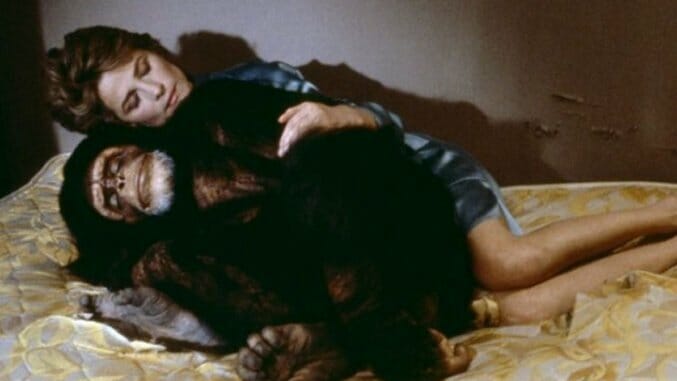An Ear for Film: Charlotte Rampling’s Lovers
The three best movie-related podcast episodes of the week.

Each week, Dom plumbs the depths of podcast nation to bring you the best in cinema-related chats and programs. If writing about music is like dancing about architecture, then writing about movie podcasts is like listening to someone describe someone dancing about architecture.
It was a week of bounty for movie podcasts. When your Monday opens with an especially heated debate between Devin and Amy over at The Canon, you can bet you’ve already tapped into an especially rich vein of Jungian cinematic quibbling.
The co-hosts disagreed fundamentally over James L. Brooks’ Broadcast News, which meant Devin—who adores the film—dismissed Amy outright, while, in turn, she repeatedly insisted the movie was mediocre at best, partly due to the fact that in their Working Girl episode, which served as the foundation for this discussion, Devin seemed to make points that in the case of Broadcast News he rescinded through the auspices of a movie he really likes. Regardless, once the two hosts began to touch on the film’s relevance today—pinging “news” websites like the .gif-laden Buzzfeed—they seemed to totally forget that they are both employed by websites (MTV and Birth.Movies.Death) which tread in the exact same world of loose definitions of what constitutes “news”. That’s not meant to be a dig on either website whatsoever—I deeply respect writers at both—but the weird lack of self-awareness in their talk derails way too many of their otherwise salient points.
On KCRW’s The Treatment, Quentin Tarantino stops by to talk to everyone’s best friend Elvis Mitchell, revealing that Mitchell was instrumental in the early stages of Hateful Eight development, talking shit out with Tarantino to take the original story from a potential Django episode to something entirely different. The two cover a lot of ground in a half hour—helped, no doubt, by Tarantino’s limitless penchant for speed-mythologizing—from their love for Samuel L. Jackson, to issues of race in Tarantino’s recent films, to a protracted discussion of samurai and Yakuza films influencing Reservoir Dogs. (When QT shouts out Sydney Pollack’s The Yakuza for bringing him to tears, I almost fell in love with the director all over again.) Even when Tarantino describes beat-for-beat the first half hour of Hateful Eight, spurred on only by Mitchell’s small request to give listeners a short synopsis, Tarantino’s natural gift as a storyteller genuinely excited about the stories he tells carries an otherwise totally unnecessary bit of conversation.
We Hate Movies, as always, had a worthwhile week ripping on Keanu Reeves serial killer movie The Watcher, which prominently features Rob Zombie song “Dragula,” which holds a special place in my heart because I got my first tattoo with that song as a soundtrack, blasted to the point of incomprehensibility by the tattoo artist who, when questioned at what age he got his first tattoo, responded, “Eight, on my front porch with a needle, thread and ink pen.” My first tattoo is definitely my worst tattoo.
So together let’s dig through the ditches, burn through the witches, and slam in the back of my picks for the three best podcast episodes of the week:
-

-

-

-

-

-

-

-

-

-

-

-

-

-

-

-

-

-

-

-

-

-

-

-

-

-

-

-

-

-

-

-

-

-

-

-

-

-

-

-

 Pet Cinematary
Pet Cinematary I Was There Too
I Was There Too Little Gold Men
Little Gold Men






































